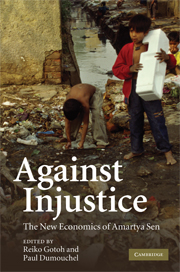Book contents
- Frontmatter
- Contents
- List of figures
- List of tables
- List of contributors
- Acknowledgements
- Introduction
- Part I
- Part II
- Part III
- 10 On applying synthetic indices of multidimensional well-being: health and income inequalities in France, Germany, Italy, and the United Kingdom
- 11 Assessing children's capabilities: operationalizing metrics for evaluating music programs with poor children in Brazilian primary schools
- 12 The search for socially sustainable development: conceptual and methodological issues
- 13 Part IV
- Index
- References
11 - Assessing children's capabilities: operationalizing metrics for evaluating music programs with poor children in Brazilian primary schools
Published online by Cambridge University Press: 18 January 2010
- Frontmatter
- Contents
- List of figures
- List of tables
- List of contributors
- Acknowledgements
- Introduction
- Part I
- Part II
- Part III
- 10 On applying synthetic indices of multidimensional well-being: health and income inequalities in France, Germany, Italy, and the United Kingdom
- 11 Assessing children's capabilities: operationalizing metrics for evaluating music programs with poor children in Brazilian primary schools
- 12 The search for socially sustainable development: conceptual and methodological issues
- 13 Part IV
- Index
- References
Summary
Introduction
Evaluating the impact of educational changes on children's capabilities can be done in a diversity of ways. Indeed, there is no unique way of using the CA (capability approach) for normative purposes. One possible route is to define a methodology based on the most striking characteristics of the approach and then to create different categories of assessment from the particular features of the targeted programs. When the CA is used as an informational space for normative valuations we have the approach at its best. This means that the approach is incomplete by necessity (in the sense that it depends on the use of particular substantive theories) and it is not used beyond its conceptual limits.
Among the most important features of the approach, as defined by Sen (1985; 1992; 1999) and Nussbaum (2000), may be mentioned:
objective nature of functionings and capabilities, avoiding the use of subjective metrics and the problem of adaptive preferences;
multidimensional assessment of capability-laden normative exercises, exploring the differential impact of actions and state-of-affairs on individuals' well-being and agency;
emphasis on autonomy as a characteristic of individuals' advantage-point, providing a distinct perspective on how people are able to shape their well-being;
comparable results, based on the principle of multiple realisability (Nussbaum, 2000: 77).
When addressing the issue of children's capabilities the importance of temporal dimensions in constituting the characterization of the autonomy and well-being of individuals must be noted. The same capability has different autonomy-values if belonging to different moments in time.
Information
- Type
- Chapter
- Information
- Against InjusticeThe New Economics of Amartya Sen, pp. 252 - 274Publisher: Cambridge University PressPrint publication year: 2009
References
Accessibility standard: Unknown
Why this information is here
This section outlines the accessibility features of this content - including support for screen readers, full keyboard navigation and high-contrast display options. This may not be relevant for you.Accessibility Information
- 3
- Cited by
